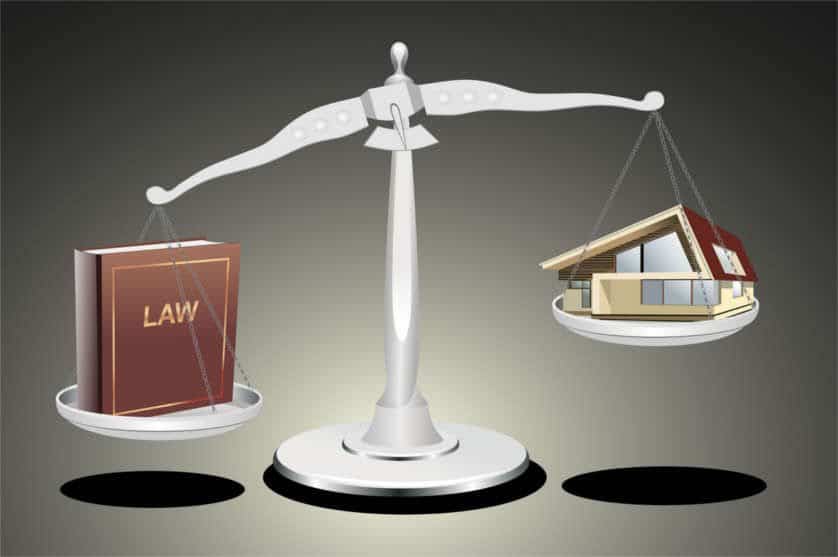Separate Funds to Buy Joint Property in Arizona | Hildebrand Law, PC

Table of Contents
Generally, property acquired before marriage remains the separate property of the spouse. In some cases, however, it transmutes to community property. This can happen when a spouse purchases property with separate funds to be held jointly. What is the status of separate funds invested in joint property? In In Re Marriage of Berger, 680 P.2d 1217 (Ariz. Ct. App. 1983), the Arizona Court of Appeals addressed transmutation issues.
Facts and Procedure
Mrs. Berger had substantial personal assets when she married Mr. Berger in 1968. Mr. Berger had little and did not earn much during the marriage. The couple lived largely on wife’s separate money.
Two of Mr. Berger’s businesses are relevant here. In 1971, he started Jackie’s Dress Shops, Inc. He financed this by borrowing $60,000 of Mrs. Berger’s separate funds. He signed promissory notes for the loan, providing that the funds would be repaid with his own separate property.
The business failed and the corporation was dissolved. Mrs. Berger filed a civil complaint on the notes in August 1979. It was consolidated with her dissolution petition.
The second relevant business transaction was when the couple bought a lot in Paradise Valley for $25,000. Again, the wife’s money paid for the land, but the title was taken in joint tenancy. They built a house on the site for about $170,000, with $65,000 borrowed and the rest funded by Mrs. Berger’s assets.

Mrs. Berger petitioned for a dissolution of the marriage in June 1979. The trial court disposed of the couple’s assets, determined Mr. Berger’s obligation on the promissory notes, and issued orders concerning support. Both parties have appealed.
The court determined that Mrs. Berger paid for the Paradise Valley property with her separate funds. However, the deed was taken in joint tenancy. In Arizona, when one spouse uses separate property to purchase jointly-held property, she gifts an interest to the other spouse. Mrs. Berger acknowledges that Mr. Berger owns a one-half interest in the land.
The court also found that Mrs. Berger gifted a one-half interest in the house built on the land with her separate funds. She asserts that this was an error. She argues that the gift presumption does not extend to improvements subsequently placed upon the property.
She maintains that a co-tenant improving joint tenancy property with separate funds is entitled to reimbursement. In finding that the improvements constituted a gift to the husband, the court emphasized that the lot purchase and home construction plans were close in time. It did not inquire into Mrs. Berger’s actual intent but simply applied the gift presumption to both.
However, the Court of Appeals found that the proximity of the construction plans to the lot purchase was not relevant to donative intent. It ruled that extending the gift presumption to improvements placed on the property soon after its acquisition was improper. For this, it cited Collier v. Collier, 242 P.2d 537 (1952) and Bowart v. Bowart, 625 P.2d 920 (1980).
Mr. Berger argues that the record supports a finding of the gift of the improvements, irrespective of any legal presumption. Inter Vivos gifts of real property require clear, unmistakable and unequivocal intention on the donor’s part to make a gift.
The donative intent is ascertained in light of all surrounding circumstances. Mr. Berger says that the parties’ 1973 income tax return proves the wife’s donative intent. Before buying this lot, the couple owned a home in Phoenix in joint tenancy. In 1974, they filed Form 2119 for the “Sale or Exchange of Personal Residence”.
The couple indicated that their own interests in the old and new residence were the same. Mr. Berger characterizes this as an “admission” that he owned a one-half interest in the new home. Mrs. Berger claims that Mr. Berger’s ownership interest is not inconsistent with her right to reimbursement. The Court of Appeals agreed that the 1973 return is not evidence of donative intent.
Determining Reimbursement Measure

Mrs. Berger argues that the measure of recovery is one-half of the enhancement value. She claims she should recover one-half the amount by which her separate-fund improvements enhanced the value of the property.
Where a co-tenant makes permanent improvements in real property, the court awards him the resulting increase in the value. Mr. Berger contends that the right to reimbursement is equitable and that it would be inequitable to award wife the enhanced value.
However, the general rule uses the “value” measure of contribution. Here, the Court found, it would be inequitable to repay Mrs. Berger’s 1972 investment with 1983 dollars. Mr. Berger will benefit from the increased value of the improvements made with her separate funds.
Husband’s Liability on Promissory Notes

The trial court ruled that the husband owed wife the sum of $60,000 principal plus interest at 7%. Mr. Berger contends that he is not liable on the notes. He argues that the loans specified they must be repaid by his “sole and separate property.” He claims this means Mrs. Berger must point to a specific fund from which to seek repayment.
Since he has no specific separate property fund, he argues that he cannot be ordered to repay the loans. However, Arizona cases dealing with “specific funds” involve very limited and narrowly defined sources of payment.
Here, no particular separate property was designated as the source of payment. Instead, payment was limited generally to the husband’s separate property. Although he has none at the moment, he might obtain some.
The Court found that the husband was indebted to Mrs. Berger on the promissory notes, payable only from his sole and separate property. The trial court properly entered judgment on the notes in favor of the wife. The Court of Appeals next addressed the interest rate issue.
Mrs. Berger appealed the trial court’s computing the post-decree interest rate at 7%. The statute provides that interest on a judgment shall be 10%. The only exception is if an agreement bearing a higher interest rate than 10% is reduced to judgment. In that case, the judgment bears interest as provided in the underlying agreement.
Here, the agreement bore interest at the stated rate of 7%. This was less than 10%. Therefore, the trial court erred in ruling that post-judgment interest should be 7%. The Court directed that post-judgment interest is fixed at 10%.
Spousal Maintenance, Child Support, and Attorney Fees
Mr. Berger appeals the trial court’s orders with regard to his request for spousal maintenance, child support, and attorneys’ fees. In making its orders regarding child support and attorneys’ fees, the trial court was required to consider the financial resources of both spouses.
When ruling on spousal maintenance, the court was required to determine whether the husband lacks property to provide for his reasonable needs. Here, the trial court clearly considered Mr. Berger’s award of a substantial equity interest in the home to be a primary source of income. The ruling on appeal significantly reduced the value of Mr. Berger’s interest in the Paradise Valley residence.
The Court of Appeals told the trial court to reconsider its rulings about support, maintenance, and attorneys’ fees.

Other Issues
The Court of Appeals approved the trial court’s division of community property. Although Mrs. Berger got substantially more, she paid for most of it with community funds. The Court noted that an equivalent distribution of property is not required if sound reason justifies an unequal distribution.
The Court also affirmed the trial court’s granting Mrs. Berger an option to purchase Mr. Berger’s share of the home. It ordered the trial court to readjust the option price in light of its ruling on reimbursement for the joint tenancy improvements.
Lastly, Mr. Berger raised an issue concerning the disposition of $18,000 in his attorneys’ trust account. The trial court found that the $18,000 was community property, to be divided equally between the parties. The Court of Appeals declined to make any orders concerning this account but stated that the trial court has the power to divide it equitably.
Disposition

The Court vacated the trial court’s orders concerning the parties’ respective interests in the Paradise Valley residence. It also vacated the trial court’s orders concerning the option price, to the extent they are inconsistent with this opinion. The trial court’s orders regarding child support, spousal maintenance, and attorneys’ fees are vacated.
The trial court is ordered to make new orders in light of the changed circumstances. The Court affirmed the trial court’s orders with respect to the promissory notes and the community furnishings.
If you have questions about purchasing property with separate funds to be held jointly in an Arizona divorce case, you should seriously consider contacting the attorneys at Hildebrand Law, PC. Our Arizona community property and family law attorneys have decades of combined experience successfully representing clients in community property disputes and family law cases.
Our family law firm has earned numerous awards such as US News and World Reports Best Arizona Family Law Firm, US News and World Report Best Divorce Attorneys, “Best of the Valley” by Arizona Foothills readers, and “Best Arizona Divorce Law Firms” by North Scottsdale Magazine.
Call us today at (480)305-8300 or reach out to us through our appointment scheduling form to schedule your personalized consultation and turn your Arizona community property or family law case around today.
Contact Form
More Articles About Arizona Community Property Laws
- ARIZONA COMMUNITY PROPERTY LAWS
- VALUING GOODWILL OF A LAWFIRM IN AN ARIZONA DIVORCE
- COMMUNITY PROPERTY AND ANNULMENT OF MARRIAGE IN ARIZONA
- SOLE AND SEPARATE FUNDS USED TO BUY A HOUSE IN ARIZONA
- DIVISION OF MILITARY RETIREMENT AND DISABILITY PAYMENTS IN AN ARIZONA DIVORCE
- SEPARATE PROPERTY CONTRIBUTIONS WHEN DIVIDING COMMUNITY PROPERTY IN ARIZONA
- PROPERTY HELD AS JOINT TENANTS WITH RIGHTS OF SURVIVORSHIP IN AN ARIZONA DIVORCE
- DIVIDING RETIREMENT ACCOUNTS IN AN ARIZONA DIVORCE
- ARIZONA DIVORCE DEBT
- EFFECT OF PLACING COMMUNITY PROPERTY INTO A FAMILY TRUST IN ARIZONA
- COMMUNITY PROPERTY LOTTERY WINNINGS IN ARIZONA
- IS SEPARATE PROPERTY LIABLE FOR COMMUNITY DEBT IN ARIZONA
- CREDITOR COLLECTING A SEPARATE DEBT WITH COMMUNITY PROPERTY IN ARIZONA
- TITLE AFFECTS COMMUNITY PROPERTY RIGHTS IN ARIZONA
- COMMINGLING SEPARATE PROPERTY WITH COMMUNITY PROPERTY IN ARIZONA
- ARE MILITARY RETIREMENT PAYMENTS COMMUNITY PROPERTY IN ARIZONA
- EFFORT DOES NOT ENTITLE A SPOUSE TO MORE COMMUNITY PROPERTY IN ARIZONA
- RESULT OF COMMINGLING COMMUNITY AND SEPARATE PROPERTY IN ARIZONA
- INCREASED VALUE OF A BUSINESS IN AN ARIZONA DIVORCE
- GIFT OF SEPARATE PROPERTY THROUGH A JOINT TENANCY DEED IN ARIZONA
- ABANDONMENT OF MARRIAGE AND COMMUNITY PROPERTY RIGHTS IN ARIZONA
- ARE PROFITS FROM A SEPARATE BUSINESS COMMUNITY OR SEPARATE PROPERTY
- TRACING SEPARATE PROPERTY COMMINGLED WITH COMMUNITY PROPERTY IN ARIZONA
- INTENTION CONTROLS TRANSMUTATION OF SEPARATE INTO COMMUNITY PROPERTY
- RECORDING A HOME IS INSUFFICIENT TO CHANGE SEPARATE PROPERTY INTO COMMUNITY PROPERTY
- COMMUNITY PROPERTY INTEREST IN A BUSINESS OWNED PRIOR TO MARRIAGE
- WHAT IS SEPARATE PROPERTY IN ARIZONA
- VALUATION AND DISTRIBUTION OPTIONS FOR A PENSION IN AN ARIZONA DIVORCE
- UNFAIR SEPARATION AGREEMENT IN ARIZONA
- UNEQUAL DIVISION OF PROPERTY IN A DIVORCE IN ARIZONA
- SEPARATE PROPERTY USED PURCHSE A HOME DURING MARRIAGE IN ARIZONA
- REIMBURSEMENT FOR PAYING SEPARATE DEBTS OF A SPOUSE IN ARIZONA
- REFUSAL TO SELL A HOUSE AFTER A DIVORCE IN ARIZONA
- PENSIONS AND DIVORCE IN ARIZONA
- MILITARY RETIREMENT PAY AND DIVORCE IN ARIZONA
- IS SEPARATE PROPERTY DIVIDED DIFFERENTLY THAN COMMUNITY PROPERTY IN ARIZONA
- IS ARIZONA A 50-50 STATE IN A DIVORCE
- IS ALL PROPERTY OWNED BY EITHER SPOUSE COMMUNITY PROPERTY IN ARIZONA
- INTEREST ON A LOAN BETWEEN SPOUSES IN ARIZONA
- IMPACT OF IMPROVEMENTS TO SEPARATE PROPERTY IN AN ARIZONA DIVORCE
- HOW TO ENFORCE DIVISION OF PROPERTY AND DEBT IN ARIZONA
- HOW TO DIVIDE PROPERTY IN ARIZONA WHEN A SPOUSE IS HIDING ASSETS
- HOW STOCK OPTIONS ARE DIVIDED IN AN ARIZONA DIVORCE
- HOW IS COMMUNITY PROPERTY DIVIDED IN ARIZONA
- HOW ARE RETIREMENT ACCOUNTS DIVIDED IN AN ARIZONA DIVORCE
- FILING A LIS PENDENS IN A DIVORCE IN ARIZONA
- FAIR COMPENSATION DEFENSE IN AN ARIZONA DIVORCE
- ENFORCE A PROPERTY SETTLEMENT AGREEMENT IN ARIZONA
- DO RULES REGARDING PROPERTY APPLY TO DEBTS IN ARIZONA
- DIVISION OF DEBT IN AN ARIZONA DIVORCE
- DIVIDING PROPERTY NOT INCLUDED IN A DIVORCE DECREE IN ARIZONA
- DIFFERENCE IN COMMUNITY AND SEPARATE PROPERTY IN ARIZONA
- DETERMINING COMMUNITY VERSUS SOLE PROPERTY IN ARIZONA
- CREATION OF A COMMUNITY LIEN ON SOLE AND SEPARATE PROPERTY IN ARIZONA
- COMMUNITY PROPERTY LAWS ABOUT A SPOUSE’S PERSONAL GUARANTEE IN ARIZONA
- CHOOSING A VALUATION DATE WHEN DIVIDING ASSETS IN A DIVORCE IN ARIZONA
- CAN A SPOUSE BE HELD LIABLE FOR CREDIT CARD DEBT IN ARIZONA
- CALCULATING A COMMUNITY LIEN ON A DEPRECIATING ASSET IN ARIZONA
- EFFECT OF A DISCLAIMER DEED OR QUIT CLAIM DEED IN A DIVORCE IN ARIZONA
- CALCULATING A COMMUNITY LIEN ON AN APPRECIATING ASSET IN AN ARIZONA DIVORCE
- BANK ACCOUNTS AND DIVORCE IN ARIZONA
- DIVIDING PAID TIME OFF IN A DIVORCE IN ARIZONA
- EQUALIZATION PAYMENTS IN AN ARIZONA DIVORCE
- OMITTED ASSETS IN AN ARIZONA DIVORCE DECREE
- CRSC PAY AND DIVORCE IN ARIZONA
- JUDGMENT FOR SEPARATE PROPERTY STOLEN DURING MARRIAGE
- JUDGE IGNORES A BUSINESS APPRAISAL IN AN ARIZONA DIVORCE
- REIMBURSEMENT OF SEPARATE PROPERTY IN A DIVORCE IN ARIZONA
- SEPARATE PROPERTY INCREASES IN VALUE DURING MARRIAGE IN ARIZONA
- PERSONAL INJURY AWARDS AND DIVORCE IN ARIZONA
- VALUING A BUSINESS IN A DIVORCE IN ARIZONA WITHOUT FINANCIAL DOCUMENTATION
- RETIREMENT INCREASE AFTER DIVORCE IN ARIZONA
- FAILURE TO DISCLOSE FINANCIAL INFORMATION IN A DIVORCE IN ARIZONA
- UNAUTHORIZED USE OF A POWER OF ATTORNEY TO DISPOSE OF SPOUSE’S SEPARATE PROPERTY
- FINANCIAL AGREEMENTS BETWEEN UNMARRIED COUPLES IN ARIZONA
- WHEN A CREDITOR MAY TAKE SOLE AND SEPARATE ASSETS OF A SPOUSE
- LIABILITY FOR A SPOUSE’S NEGLIGENCE IN ARIZONA
- VALUATION OF STOCK HOLDINGS AND DEBT IN AN ARIZONA DIVORCE
- LOANS BEFORE MARRIAGE IN ARIZONA
- CREDITOR LIEN ON JOINT TENANCY PROPERTY IN AN ARIZONA DIVORCE
- INCREASE IN VALUE OF A SEPARATE PROPERTY BUSINESS STOCK IN AN ARIZONA DIVORCE
- STATEMENTS REGARDING PROPERTY ARE BINDING IN AN ARIZONA DIVORCE
- DEBTS NOT INCLUDED IN A DIVORCE DECREE IN ARIZONA
- FRAUDULENT QUIT CLAIM DEED IS INEFFECTIVE IN AN ARIZONA DIVORCE
- DISPOSITION OF COMMUNITY PROPERTY IN A LAST WILL AND TESTAMENT
- DIVIDING BUSINESS PROFITS DURING A DIVORCE IN ARIZONA
- MINORITY DISCOUNT IN A BUSINESS VALUATION IN AN ARIZONA DIVORCE
- HOW A BUSINESS IS DIVIDED IN A DIVORCE IN ARIZONA
- DIVISION OF CIVIL SERVICE RETIREMENT SYSTEM BENEFITS IN A DIVORCE IN ARIZONA
- DISABILITY PAY AND COMMUNITY PROPERTY IN ARIZONA
- VALUATION OF A PROFESSIONAL PRACTICE IN A DIVORCE IN ARIZONA
- JOINING A THIRD PARTY IN A DIVORCE IN ARIZONA
- CONTESTING A RULE 69 AGREEMENT WITHOUT A TRIAL IN ARIZONA
- DEFENSE TO REIMBURSEMENT FOR PAYMENT OF COMMUNITY BILLS IN AN ARIZONA DIVORCE
- SURVIVOR ELECTION AND MILITARY RETIREMENT IN AN ARIZONA DIVORCE
- DEFERRED MILITARY RETIREMENT IN AN ARIZONA DIVORCE
- DIVISION OF DEFERRED RETIREMENT OPTION PLANS IN AN ARIZONA DIVORCE
- CLAIMS OF WASTE IN AN ARIZONA DIVORCE
- DIVIDING ACCOUNTS RECEIVABLE IN A DIVORCE IN ARIZONA
- MINORITY DISCOUNT BUSINESS APPRAISAL IN AN ARIZONA DIVORCE
- FINDING A REALTOR DURING A DIVORCE IN ARIZONA
- WHAT TO DO IF YOUR SPOUSE IS HIDING ASSETS IN A DIVORCE IN ARIZONA
- TYPES OF BUSINESS APPRAISALS IN AN ARIZONA DIVORCE
- BENEFICIARY DESIGNATIONS AFTER DIVORCE IN ARIZONA
- RETIREMENT ACCOUNTS, QDROs, AND DIVORCE IN ARIZONA
- DIVORCE AND REFINANCING A MORTGAGE IN ARIZONA
- PROVING PROPERTY IS SOLE AND SEPARATE IN AN ARIZONA DIVORCE
- 7 REASONS YOU MAY HAVE TO SHARE YOUR INJURY SETTLEMENT IN AN ARIZONA DIVORCE
- PERSONAL INJURY SETTLEMENT IN A DIVORCE IN ARIZONA
- CLAIM OF A SPOUSE’S PERSONAL INJURY AWARD IN AN ARIZONA DIVORCE
- PERSONAL INJURY AWARDS AND DIVORCE SETTLEMENTS IN ARIZONA
- DIVORCE AND PERSONAL INJURY AWARDS IN ARIZONA
- ENFORCING A SURVIVOR BENEFIT ELECTION IN A PENSION IN ARIZONA
- MURDERER SPOUSE AND COMMUNITY PROPERTY IN ARIZONA
- DAMAGES CAUSED BY A COMMUNITY PROPERTY VEHICLE IN ARIZONA
- COMPENSATION FOR WASTE OF COMMUNITY ASSETS IN ARIZONA
- TRANSMUTING SEPARATE PROPERTY INTO COMMUNITY PROPERTY BY COMMINGLING
- LIABILITY FOR DEBT GUARANTEED BY THE OTHER SPOUSE IN ARIZONA
- USING COMMUNITY FUNDS TO PAY A MORTGAGE ON A SPOUSE’S SOLE AND SEPARATE HOUSE
- DISCLAIMER DEED AND DIVORCE IN ARIZONA
- COMMUNITY LIEN ON A SOLE AND SEPARATE BUSINESS IN A DIVORCE IN ARIZONA
- YOU’RE GETTING A DIVORCE, ARE YOU SURE YOU WANT THE HOUSE?
- CHANGING JOINT PROPERTY TO COMMUNITY PROPERTY IN ARIZONA
- SEGREGATING SEPARATE PROPERTY FROM COMMUNITY PROPERTY IN ARIZONA
- ARIZONA COMMUNITY PROPERTY LAWS FREQUENTLY ASKED QUESTIONS
As Seen on CBS News, ABC News, NBC News, and Fox News

